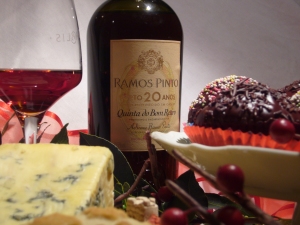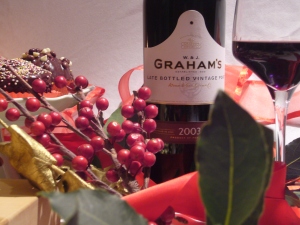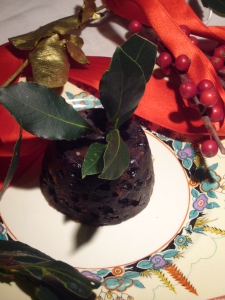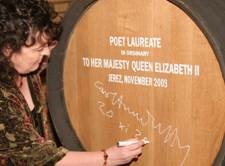Does Bottle Aged or Wood Aged Port make the best festive match?
So there’s about a week to go before Christmas, which mean I, like a lot of us, am planning my menu and thinking about what wines to serve. Since my recent trip to the Douro Valley, Portugal, I am giving far more thought to which Port to buy than I have done in previous years.
Broadly speaking Ports fall into two categories: those that are aged in bottle, such as Vintage or Late Bottle Vintage (LBV). They are red/purple in colour and have a black/red fruit and chocolate flavour profile. Then there are those which are aged in wood barrels, such as Tawnies or Colheitas, which are more oxidised so are browner in colour and have a caramel, nut and saline flavour profile.
At Chr istmas I like to be a generous host which means at various points over the holiday: mince pies, Christmas cake, pudding, walnuts, stilton and my, some would say ubiquitous, Chocolate Chilli Cupcakes will all make an appearance. This means the food that I serve with my port (if I group together the dried fruit baking) will also have three very different flavour profiles. So the big question is: what foods go best with tawnies and which go best with bottle aged ports? Surely this is a question that is worth mulling over! So I decided to do a taste test and I invited two willing friends: Paul and Samantha to join me.
istmas I like to be a generous host which means at various points over the holiday: mince pies, Christmas cake, pudding, walnuts, stilton and my, some would say ubiquitous, Chocolate Chilli Cupcakes will all make an appearance. This means the food that I serve with my port (if I group together the dried fruit baking) will also have three very different flavour profiles. So the big question is: what foods go best with tawnies and which go best with bottle aged ports? Surely this is a question that is worth mulling over! So I decided to do a taste test and I invited two willing friends: Paul and Samantha to join me.
I opened a bottle of Ramos Pinto 30 year old Tawny, a gift from my charming host at the Quinta do Bom Retiro: Sr. João Nicolau de Almeida. It is a fantastic port with lots of caramel and toffee flavours off set with notes of almonds and seaweed. This is a top-notch Tawny.
 The second, W&J Graham’s Late Bottle Vintage 2003, I had bought from my new favourite wine shop: The Good Wine Shop in Kew, London http://www.thegoodwineshop.co.uk/ for a very reasonable £15.00. It was sweet and chocolaty with lots of plum and dark cherry fruit. It might not have had the quality of the Ramos Pinto, but then it is a mere 6 year-old colt. It is nevertheless a good example of a bottle-aged style.
The second, W&J Graham’s Late Bottle Vintage 2003, I had bought from my new favourite wine shop: The Good Wine Shop in Kew, London http://www.thegoodwineshop.co.uk/ for a very reasonable £15.00. It was sweet and chocolaty with lots of plum and dark cherry fruit. It might not have had the quality of the Ramos Pinto, but then it is a mere 6 year-old colt. It is nevertheless a good example of a bottle-aged style.
For the food we had a festive spread of Stilton, Mince Pies, and a lovely light Christmas Pudding made by professional pudding maker Susan Gardner and this year’s new, traditional favourite, Chocolate Chilli Cupcakes. This is what we found:
|
W&J Graham’s LBV 2003 |
Ramos Pinto 30 year old Tawny |
| Stilton |
The contrast is too marked. A taste in two halves. |
A melodious match. The saltiness in the Tawny matches the saltiness in the cheese. The wines sweetness makes a good underlay for all the flavours. |
| Mince Pies |
Works wells. A good dark, fruity combination. |
Less good. The wine becomes over sweet. |
| Christmas Pudding |
A terrific match! Juicy and festive. Delicious. |
Interestingly this makes the pudding taste nuttier than when it is served with the LBV. A good match. |
| Chocolate Chilli Cupcakes |
Fabulous! The great marriage of chocolate flavours with a spank of chilli on the finish. |
Not so good. The flavours of the two components are individually complex enough; together it is too complicated.
|
So our conclusions are: go for a bottle aged Port (LBV or splash out on Vintage) with the cake, pudding, mince pies and chocolate chilli cupcakes and a Tawny with the stilton and walnuts. So yes you will need two bottles: no matter it’s Christmas!
Here are a few other ports I particularly enjoyed on my trip to the Douro:
BOTTLE AGED WINES
 Quinta do Crasto, Vintage 2007
Quinta do Crasto, Vintage 2007
This port has an opaque, black colour which shows how young it is, plus the alcohol is still very obvious on the nose, further proof of its juvenility. But there are a myriad of flavours on the palate: plums, chocolate, raisins and spice and the texture is so thick, juicy and robust that this wine will definitely age and improve for years, perhaps decades, yet.
Quinta da Gricha, Vintage 2007, Churchill Graham Ltd
A sweet smelling nose with notes of dried flowers and hay. The palate has lots of fine damson notes and a touch of spice. An elegant and feminine port which I hope to re-visit when it has aged a little more and no doubt become even more graceful.
Porto Calem, Late Bottle Vintage 2004
A fresh young ruby colour. Rather than having a strong sweet /alcohol fortified wine smell, the nose is quite ‘winey’. The palate has herbaceous notes with a touch of chocolate.
Portal Vintage Port 2003
Far more elegant than an LBV, this port is very juicy with a complex range of flavours: plums and prunes, rosemary and mint, coffee and chocolate. The alcohol is still fairly obvious but will meld into the wine with time.
TAWNY PORTS
Quinta de la Rosa, Colheita 1997
A pretty Tawny colour with a nutty, woody nose. The palate is intense and very, very nutty with a long finish. Tasty!
Kopke Colheita 1978
The colour is like beeswax polished wood with a hint of green. The nose has an attractive vegetal/saline note which reminds me of seaweed salad in Japanese restaurants. The palate has notes of pepper, salt and almonds. A distinctive wine.
Burmester Colheita 1963
The colour is of a French polished antique table. The palate has flavours of barley sugar and linseed oil. It is very, very intense.
Portal 40 Year Old Aged Tawny Port
An attractive polished old oak colour with a greenish tinge, typical of older tawnies. The nose is very pungent and nutty with notes of linseed oil. Very rich.
Poet Carol Anne Duffy, was presented with a butt (720 bottles) of sherry at a recent ceremony in Jerez, Spain, to celebrate her appointment as Poet Laureate.

Carol Ann Duffy signs her butt of sherry.
The Sherry Institute of Spain revived the old tradition of paying The Poet Laureate a ‘butt of sack’ when Ted Hughes was appointed Laureate in 1984. Andrew Motion was also presented with more sherry than he could possibly drink when he took up the Laureate mantel in 1999.
The press release that the Sherry Institute sent me includes a rather banal quote from Duffy. ‘With your Third British Poet Laureate standing here, I think we can say that we have a tradition – and a lovely connection between two countries who value both poetry and great Sherry.’
I think Duffy is a fantastic poet – funny, insightful, original – so I was disappointed to read this bland sentence, especially as wine is one of my favourite topics and I love seeing it described in a way that is poetic and full of life. So I pulled my copy of Duffy’s poems The World’s Wife off the shelf and had a look to see if I could find anything about wine.
I did in the poem Mrs Midas. The poem is the story of Midas who is granted a wish by Dionysus, he asks for a special power so that everything he touches turns to gold. When he comes home to Mrs Midas she pours him a glass of wine ‘with a shaking hand, a fragrant bone dry white from Italy, then watched as he picked up the glass, goblet, golden chalice, drank.’
Here wine is a metaphor for the simple, everyday pleasures in life, something special that brightens up a quiet evening, something that has now been lost in a foolish pursuit of extreme wealth. It is the sort of witty and intelligent, feet on the ground, writing that has earned Duffy so many fans.
I hope Duffy enjoys her butt of sherry especially as I doubt that she would let such a generous accolade go to her head.
Here is Mrs Midas in full:
Mrs Midas by Carol Ann Duffy
It was late September. I’d just poured a glass of wine, begun
to unwind, while the vegetables cooked. The kitchen
filled with the smell of itself, relaxed, its steamy breath
gently blanching the windows. So I opened one,
then with my fingers wiped the other’s glass like a brow.
He was standing under the pear tree snapping a twig.
Now the garden was long and the visibility poor, the way
the dark of the ground seems to drink the light of the sky,
but that twig in his hand was gold. And then he plucked
a pear from a branch – we grew Fondante d’Automne –
and it sat in his palm like a light bulb. On.
I thought to myself, Is he putting fairy lights in the tree?
He came into the house. The doorknobs gleamed.
He drew the blinds. You know the mind; I thought of
the Field of the Cloth of Gold and of Miss Macready
He sat in that chair like a king on a burnished throne.
The look on his face was strange, wild, vain. I said,
What in the name of God is going on? He started to laugh.
I served up the meal. For starters, corn on the cob.
Within seconds he was spitting out the teeth of the rich.
He toyed with his spoon, then mine, then with the knives, the forks.
He asked where was the wine. I poured with shaking hand,
a fragrent, bone-dry white from Italy, then watched
as he picked up the glass, goblet, golden chalice, drank.
It was then that I started to scream. He sank to his knees.
After we had both calmed down, I finished the wine
on my own, hearing him out. I made him sit
on the other side of the room and keep his hands to himself.
I locked the cat in the cellar. I moved the phone.
The toilet I didn’t mind. I couldn’t believe my ears:
how he’d had a wish. Look, we all have wishes; granted.
But who has wishes granted? Him. Do you know about gold?
It feeds no one; aurum, soft, untarnishable; slakes
no thirst. He tried to light a cigarette; I gazed, entranced,
as the blue flame played on its luteous stem. At least,
I said, you’ll be able to give up smoking for good.
Seperate beds. In fact, I put a chair against my door,
near petrified. He was below, turning the spare room
into the tomb of Tutankhamun. You see, we were passionate then,
in those halcyon days; unwrapping each other, rapidly,
like presents, fast food. But now I feared his honeyed embrace,
the kiss that would turn my lips to a work of art.
And who, when it comes to the crunch, can live
with a heart of gold? That night, I dreamt I bore
his child, its perfect ore limbs, its little tongue
like a precious latch, its amber eyes
holding their pupils like flies. My dream-milk
burned in my breasts. I woke to the streaming sun.
So he had to move out. We’d a caravan
in the wilds, in a glade of its own. I drove him up
under cover of dark. He sat in the back.
And then I came home, the women who married the fool
who wished for gold. At first I visited, odd times,
parking the car a good way off, then walking.
You knew you were getting close. Golden trout
on the grass. One day, a hare hung from a larch,
a beautiful lemon mistake. And then his footprints,
glistening next to the river’s path. He was thin,
delirious; hearing, he said, the music of Pan
from the woods. Listen. That was the last straw.
What gets me now is not the idiocy or greed
but lack of thought for me. Pure selfishness. I sold
the contents of the house and came down here.
I think of him in certain lights, dawn, late afternoon,
and once a bowl of apples stopped me dead. I miss most,
even now, his hands, his warm hands on my skin, his touch.
 istmas I like to be a generous host which means at various points over the holiday: mince pies, Christmas cake, pudding, walnuts, stilton and my, some would say ubiquitous, Chocolate Chilli Cupcakes will all make an appearance. This means the food that I serve with my port (if I group together the dried fruit baking) will also have three very different flavour profiles. So the big question is: what foods go best with tawnies and which go best with bottle aged ports? Surely this is a question that is worth mulling over! So I decided to do a taste test and I invited two willing friends: Paul and Samantha to join me.
istmas I like to be a generous host which means at various points over the holiday: mince pies, Christmas cake, pudding, walnuts, stilton and my, some would say ubiquitous, Chocolate Chilli Cupcakes will all make an appearance. This means the food that I serve with my port (if I group together the dried fruit baking) will also have three very different flavour profiles. So the big question is: what foods go best with tawnies and which go best with bottle aged ports? Surely this is a question that is worth mulling over! So I decided to do a taste test and I invited two willing friends: Paul and Samantha to join me. The second, W&J Graham’s Late Bottle Vintage 2003, I had bought from my new favourite wine shop: The Good Wine Shop in Kew, London http://www.thegoodwineshop.co.uk/ for a very reasonable £15.00. It was sweet and chocolaty with lots of plum and dark cherry fruit. It might not have had the quality of the Ramos Pinto, but then it is a mere 6 year-old colt. It is nevertheless a good example of a bottle-aged style.
The second, W&J Graham’s Late Bottle Vintage 2003, I had bought from my new favourite wine shop: The Good Wine Shop in Kew, London http://www.thegoodwineshop.co.uk/ for a very reasonable £15.00. It was sweet and chocolaty with lots of plum and dark cherry fruit. It might not have had the quality of the Ramos Pinto, but then it is a mere 6 year-old colt. It is nevertheless a good example of a bottle-aged style. Quinta do Crasto, Vintage 2007
Quinta do Crasto, Vintage 2007
